Home <<< Author: B >>> C
Jump to:
Gulnar Ali Balata |
Gary Beck |
Paul Beckman |
Denise Bergman |
Morris Berman |
C. L. Bledsoe |
Mary Bonina |
Alan Britt |
Erika Burkart |
Martin Burke |
Philip E. Burnham, Jr. |
Olivia Bush
Gulnar Ali Balata
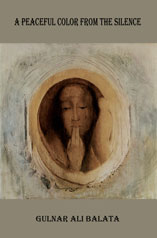 A Peaceful Color From The Silence by Gulnar Ali Balata
A Peaceful Color From The Silence by Gulnar Ali Balata
Červená Barva Press, 2016-
Gulnar Ali Balata is a Kurdish American poet, novelist, short-story writer, teacher, and translator. She was born in Kurdistan in 1974. Gulnar is the author of six books, three books of poems in the Kurdish language, Luna and Twelve Months (2006), Song of the Sad Ruins (2008), and A Breath from Letters of Borders Dream (2012) published in Duhok, Kurdistan. My Soul Still a Virgin is a collection of translated poems from Kurdish and Arabic to English by the author in 2010. My Poems Weep to the Seagulls (2014), is a book of poems published in Arabic, in Kurdistan. Kurdonya, a novel written in the Arabic language (2015), was published in Syria.
Gulnar has been published in numerous literary journals, websites and anthologies in Kurdish and Arabic languages, which are her first and second languages. Her work has been translated into many languages, and has been published in newspapers and magazines, in Kurdish and extensively on the internet.
She was a teacher in Kurdistan and taught English for three years before she left home in 1996. Gulnar received an Associate's degree in Art from Bunker Hill Community College in 2009.
She has participated in several poetry festivals within the Kurdish Region, and also abroad, in Turkey and Europe. From her outstanding cooperation, and successful writing, she has received awards from her work, and has been listed as one of the top Kurdish Women Voices in modern Kurdish poetry.
Gulnar Ali Balata's fourth volume of poetry, A Peaceful Color From The Silence, is an intimate gift by a mature poet infused with love for her tattered homeland of Iraqi Kurdistan. Her pen ripples with sparkling rivers and her expectant heart wrings with sadness as she infuses her poems in shooting stars and sweet dew, as "tears braid Fate's threads... shoulder/ the coffin of [her] childhood." The poet is "a weaned child," an "immigrant girl," a "lover," and "the melody for the executed." When "in exile... beyond the ocean... the coffins write [her] lines." This poet insists on the possibility of a "new page from a new sorrow/with a happy heart/ Make your name in my peace/symbol of a gorgeous love's spring." We take this journey with Balata and arrive strangely hopeful, crying tears of love for the resilience of the human spirit.
$17.00 | ISBN: 978-0-9966894-5-8 | 73 Pages | In Stock
-Molly Lynn Watt, On Wings of Song and Shadow People
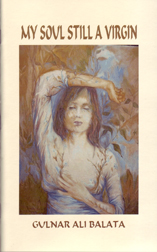 My Soul Still A Virgin by Gulnar Ali Balata
My Soul Still A Virgin by Gulnar Ali Balata
Červená Barva Press, 2010-
Cover painting by Ghada Habib
Gulnar Ali Balata was born in Iraqi Kurdistan in 1974. She is the author of two books of poems, Luna and Twelve Months (Hawar Press, 2006) and Song of the Sad Ruins (Hawar Press, 2008) published in Duhok, Iraq. Gulnar has had work appear in a number of literary journals, websites and anthologies in Kurdish and Arabic languages which are her first and second languages. She is now busy with her first story, a novel, and a third book of poetry.
She received an associates degree in English from Duhok, Iraq. She taught English for three years before she left home in 1996. Gulnar received an associates degree from Bunker Hill Community College in 2009. She currently is working on her bachelors degree in art. Her work has been published in newspapers and magazines in Kurdish and extensively on the Internet.
She has been listed as one of the top Kurdish women's voices in modern Kurdish poetry. Her poems have a romantic power. She uses a clean and pure vocabulary.
These are poems of exile, torn from the soil of the author's native Kurdistan. They are poems of the human spirit orphaned. They demand of the reader the care and compassion any orphan requires to retain hope and nurture the promise of return.
-T. Michael Sullivan, Director William Joiner Center's Writers' WorkshopGulnar's poetry speaks in English the language of her native Kurdistan. The mountains, streams, and valleys are both harsh and sensitive barriers in the mist. The ever present partridge reminds us of the country's beauty and beyond them and before them lies its sadness. Gulnar Ali Balata is a wonderful poet whom it has been my great pleasure to work with for the past several years watching her adapt her Kurdish and Arabic poetry to English.
-Tom Hooper, Bunker Hill, Community College
My soul still a virgin
The night holds its wings
Over the side of my expecting heart,
leaving wilted roses dew
on the morning star's face
smiling for the coming morning
that follows gulls' cheers.Tears of the sky
Flow for the grief of the night
And the vanquished body
hiding in the corner of the wilderness
Picks up his broken pieces
And what's left of his tears
To seek new.Preoccupied in abhorrent life
the maiden spirit with
its portable undying thirst,
its mystery of existence
and sense of its freedom of dreams and hope
remain after the confiscation of
waking up in the dewy morning,
Overlooking from the longing window
The chirping of birds.Three-colored autumn leaves
Squeezed with tears of grief last night
Despite struggling with the wind
Despite the rain
Adhering with tears on my car window
Smile on my face
Penetrate my skin
Dancing with Nightingale's musicSorrows of the body's reeling roar;
$7.00 | 38 Pages | In Stock
and the Spirit is still a virgin
which Lies on the lips of glamour
Calling the Moon
Waiting for the morning star.
Gary Beck
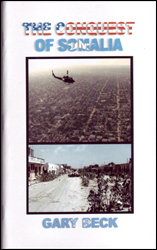 The Conquest of Somalia by Gary Beck
The Conquest of Somalia by Gary Beck
Červená Barva Press, 2008-
Gary Beck has spent most of his adult life as a theater director and worked as an art dealer when he couldn't earn a living in the theater. He has also been a tennis pro, a ditch digger and a salvage diver. His original plays and translations of Moliere, Aristophanes and Sophocles have been produced Off Broadway and toured colleges and outdoor performance venues. He currently lives in New York City, where he's busy writing fiction and his short stories have recently appeared in numerous literary magazines.
$7.00 | 36 Pages | In Stock
Paul Beckman
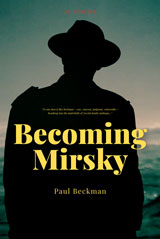 Becoming Mirsky by Paul Beckman
Becoming Mirsky by Paul Beckman
Červená Barva Press, 2023-
Paul Beckman's last flash collection, "Kiss Kiss" was a finalist for the Best Indie Awards for short story collections 2019. Paul had a micro-story selected for the 2018 Norton Anthology New Micro Exceptionally Short Fiction, was one of the winners in the 2016 The Best Small Fictions and his story "Mom's Goodbye" was chosen as the winner of the 2016 Fiction Southeast Editor's Prize. Paul was nominated for the 2019 Best Small fiction series and had a story accepted for the 2022 Best of Microfictions. He's widely published with over 750 stories. Paul hosts the monthly Zoom FBomb global flash fiction reading series.
"Finally a Mirsky book! I've loved Mirksy since he first appeared in Paul Beckman's work, and in this collection Mirsky gets to rightfully shine, coming of age with paper routes, Devil dogs, pinball, bullies, absent fathers, Jewish mothers, Kosher Soap, and the inevitable disappointments and salvations of any survived childhood, especially one set in the big city projects of America. In Becoming Mirsky, we traverse the full range of Beckman's talents-the ironic, the asinine, and the wonderfully ridiculous, yes, but also the difficult, the poignant, and the downright tragic. I'm not sure if I love Beckman or Mirsky more, but I'm thrilled to indulge both here."
-Nancy Stohlman, author of After the Rapture and Going Short: An Invitation to Flash Fiction"Every so often a memoir is penned that transcends a literary filigree of recollections and gives us an authentic, deeply felt, and brilliantly written "accounting." Paul Beckman's Becoming Mirsky is such a book. In it are the quixotic and thrashing winds of culture, of youth - of "becoming" itself. Here, Ethos and Pathos bespeak a life in a common tongue we all can understand. Here, buoyed by Beckman's wry wit, recollection is not a ghost, but rather a flawed, but earnest assortment of characters on the page we wish to know about. Care to know about. What a fine and accomplished work this is."
-Robert Scotellaro, author of What Are the Chances? and Ways to Read the World"No one does it like Beckman - raw, raucous, poignant, vulnerable - headlong into the underbelly of Jewish family mishugas; a confabulation of stories too embarrassing to own or identify with. Beckman's razor-sharp insight splays out before us, leaving the reader with nowhere to hide and forever changed. Mirsky oozes originality, warmth, humour, and pathos. Brilliant!"
-Karen Schauber, editor/author of "The Group of Seven Reimagined: Contemporary Stories Inspired By Historic Canadian Paintings" (Published by Heritage House, 2019)"From the brilliant and prolific pen of Paul Beckman comes the compelling, funny, heartbreaking novella-in-flash, Becoming Mirsky. This collection of short stories follows the life of Reuven Mirsky from his Jewish boyhood in the projects of the Bridgeport. CT, to his service in the Air Force, and on to a new life in New Haven Connecticut suburbs. This is a layered story of place and family, of tradition and loss and survival. The child of a broken home, Mirsky is perennially misunderstood and emotionally neglected. Yet he faces the world with resilience, rebelliousness, and a sarcastic tongue that gets him into no end of trouble. The writing all through is deft and beautifully distilled. In these pages, Beckman has given us an unforgettable story of disarming courage and wit and sensitivity."
-Kathy Fish, author of Wild Life: Collected WorksIn Paul Beckman's unmistakable voice, a comfortable cup of coffee with a stiff shot of scotch, we meet (or better, examine) his recurring character, Reuven Mirsky, with all of the kid-of-the-fifties memories, so vividly drawn - lemon ices and paper routes - and the characters that inhabit Mirsky's world, a Bar-Mitzvah ruining Rabbi, Mirsky's kosher soap mother, and the father who only made guest appearances from time to time. A poignant, heart-tugging, witty, and ultimately triumphant story. A wonderful and memorable read.
-Francine Witte, author of Just Outside the Tunnel of LoveWhen master flash fiction writer Paul Beckman put pen to paper for Becoming Mirsky, he demonstrated why he's been selected for a Norton Anthology, a winner for Best Small Fictions, and a winner of Fiction Southeast's prize. Becoming Mirsky is as good as it gets, following the life of Mirsly, a Jewish boy growing up in poverty in the projects of Bridgeport, Connecticut, and experiencing a rough, yet incredibly realistic, life, even among his closest family members. Becoming Mirsky illustrates how we rise above, move on, and become more.
-Niles Reddick, author of Drifting too far from the Shore, Reading the Coffee Grounds, & Road Kill and Other OdditiesBeckman hits it out of the park, again. In Becoming Mirsky, a sidesplitting flash fiction bildungsroman that traces the trials of a young man growing up in Marina Village, a public housing project, Beckman sketches with his signature hilarity and warmth, the fraught path to adulthood for Mirsky. Sometimes innocently, and sometimes not-so-naively, Mirsky navigates his way among hardscrabble family, neighbors, and schoolmates. In adventures that range from delivering groceries past a dead man's body in a funeral parlor, to relishing the thought of one day becoming a successful shoe salesman so that he can smell the tantalizing scent of new shoe leather, Mirsky gradually learns the ways of the world. And as he recounts his hilarious adventures, readers learn that Mirsky's world, while uniquely colorful, if at times hardboiled, is not so terribly different from their own.
$18.00 | ISBN: 978-1-950063-78-9 | 74 Pages
-Brad Rose, author of Lucky Animals and No. Wait. I Can Explain.
Denise Bergman
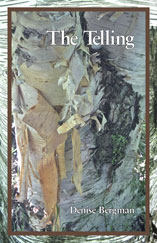 The Telling by Denise Bergman
The Telling by Denise Bergman
Červená Barva Press, 2013-
DENISE BERGMAN is the author of Seeing Annie Sullivan, poems based on the early life of Helen Keller's teacher. She conceived and edited City River of Voices, an anthology of urban poetry. Her poems have been widely published. An excerpt of her poem about a neighborhood slaughterhouse is installed as public art in Cambridge, Massachusetts.
Denise Bergman's second collection of poems is astonishingly original: I can't think of another work that uses something so small to such large effect. The Telling is ultimately about time and memory, art and truth, women and birth and death, and it all comes from "A sepia memory/mildeweed, perhaps, or not"-a tiny center around which Bergman's lyrical intelligence moves with haunting power and grace.
-Martha CollinsAs scribe to the recounting of a few harrowing childhood hours that would shape her grandmother's life, Denise Bergman examines trauma, suppression and how the honest mind must sometimes alter truth. This, then, is no simple compassion; as the narrator bears witness to the recounting of a monumental and guilt-laden secret, Bergman searches underneath the told story. In her spare, halting lines and the wide silences between them, one senses a tender and horrified listening, and in this listening an implied counterpoint, a murmur of truths unspeakable. Every object in The Telling has a vulnerable, culpable animus. All are witnesses. Bergman's testimony acknowledges the heartbreaking necessity of amnesia.
$17.00 | ISBN: 978-0-9910091-4-5 | 84 Pages | In Stock
-Frannie Lindsay
Morris Berman
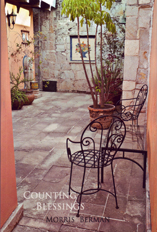 Counting Blessings by Morris Berman
Counting Blessings by Morris Berman
Červená Barva Press, 2011-
Morris Berman is an essayist, novelist, social critic, and cultural historian. He has written ten books and more than one hundred articles, and has taught at a number of universities in Europe, North America, and Mexico. He won the Governor’s Writers Award for Washington State in 1990, and was the first recipient of the annual Rollo May Center Grant for Humanistic Studies in 1992. In 2000, The Twilight of American Culture was named a "Notable Book" by the New York Times Book Review. During 2003-6 he was Visiting Professor of Sociology at the Catholic University of America in Washington, D.C., and Visiting Professor in Humanities at the Tecnológico de Monterrey, Mexico City, during 2008-9. Counting Blessings is his first volume of poetry.
Counting Blessings is an expression of gratitude for a life lived away from the madding crowd. This poetry collection was penned about a year after Berman moved to a small town in Mexico. With the frenzy of American life receding into the background, he was able to sink into the stillness of his new surroundings, allowing long-dormant creative energies to surface. In addition to Counting Blessings, he also wrote a novel and a collection of essays questioning the values of American society, roughly during the same time.
As it turns out, only a few of these poems are about life in Mexico per se. For the most part, Mexico provided the backdrop, the peaceful context in which the author’s unconscious processes were free to roam over the inner landscape, explore its contours and fine details. What emerged were vibrant memories of childhood and adolescence, of times lived abroad, of people who have come and gone. These lyrical poems capture the extraordinary essence of ordinary lived experience, and in doing so represent the true content of our lives, the simple core of what makes us human.
The poet Paul Christensen wrote of this work:
"The[se] poems are a kind of sketch pad for how one regains a life little by little from a culture that had wrapped its tentacles about you and squeezed out your breath. There is the slow process of putting oneself back together again, far from the screeching music of the television, the hard sell of the radio, the hysterical momentum of consumption as a stay against loneliness. All that abates as the exile sits in his [courtyard] with a good book, a quiet heart. The reader who pores over these memories aand observations will feel the ache to slip away to one’s own courtyard in a foreign country, to sit and let the mind idle over its thoughts, to float back to the quiet and calm and, as Berman says, to count one’s blessings."
The Courtyard
Sitting in the small courtyard that adjoins my house
is sometimes what I imagine heaven will be like.
I do it nearly every morning.
It's full of plants-
some of them quite tall-
and one occasionally puts forth deep purple flowers
more royal than the king's robe in ancient Egypt,
or maybe it was the emperor's in Rome, I forget.
The outside wall has no doorbell
but rather an actual bell, on a chain,
hanging in a kind of grotto,
the kind you might see in a campanile in Italy
or on display in Philadelphia
only much smaller, of course.
It's a ritual, after breakfast:
I plunk myself down in a wrought iron chair
next to a wrought iron table (one covered with a pane of glass)
and smoke a small cigar
while I sit and read.
Occasionally, someone rings the bell:
"¡Agua Ciel!" he cries
and I get up, and tell him
"no, gracias; tengo suficiente."
There is also a sculpted rosemary bush
that smells divine.
I can sit there all day, if I want,
in my bathrobe (the neighbors from across the street
looking down at me, from their upstairs apartment)
but eventually I get up,
water the plants,
go back inside,
and get dressed.
Sometimes I wonder who will inherit the house-
a friend, a lover-
and whether they will sit in the very same chair,
and look at the very same plants.
Of course, I plan to live to a ripe old age
having read, some years ago, Irving Berlin's obituary
and thinking I too could make it to 101.
Hopefully my Spanish will be better by then.
But if the nurse asks me,
as I'm about to wink out,
if I want more life,
I hope I'll just smile
and tell her as gently as I can,
"no, gracias; tengo suficiente."
Reviews and Interviews
Dissident Voice, July 12, 2011:
Dissident Voice
Pointing A Way: A Review of Morris Berman’s Counting Blessings
By Gary Corseri
Published in Dandelion Salad and The Greanville Post
Dandelion Salad
The Greanville PostAlso in:
Hollywood Progressive
Smirking Chimp
Review of Counting Blessings
Boston Area Small Press and Poetry Scene
July 9th, 2011: http://dougholder.blogspot.com/
Morris Berman Interview on KPFA.org program "Against the Grain", hosted by C. S. Song:
$16.00 | ISBN: 978-0-578-08091-8 | 44 Pages | Out of Print
website is http://www.juliollosa.com/; click on "Morris Berman" on the left hand side of the page; then on "Audio Interviews"; and then scroll down and click on "Poetry reading at Moe's Books."
C. L. Bledsoe
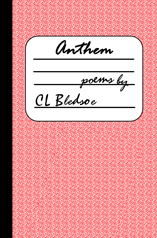 Anthem poems by CL Bledsoe
Anthem poems by CL Bledsoe
Červená Barva Press, 2009-
CL Bledsoe has published work in over 200 journals and anthologies, including The Cimarron Review, Nimrod and The Arkansas Review. Winner of the Blue Collar Review's Working People's Poetry Contest, he is also a 3-time Pushcart Prize nominee. He is an editor for Ghoti Magazine. http://www.ghotimag.com and the author of a chapbook entitled_______(Want/Need)
CL Bledsoe's Anthem is succinct, shrewd and contemporary. Bledsoe is a modern-age poet with the unique ability to bring the reader smack into the moment with him ... Anthem's poems are no exception. Often confessional, occasionally biting, Bledsoe proves once again that he is the poet for generation X, Y and whatever lies beyond.
-Patricia Gomes, editor of Adagio Verse Quarterly and poetry moderator of iVillage's Poet's WorkshopFresh, funny, hip, anarchic, jaded, secretly hopeful, angry, wry, laid-back: to read CL Bledsoe's Anthem is to enter a world that may make you twitch - but will surely help you keep on keeping on. These songs of punked-out innocence stage-strut across the page, even when they claim they're simply slacking on the couch. Join Frog and Death and the absinthe squirrels on a savvy, consciousness-jolting road-trip through the landscape of right now. I loved this smart and artful book. I bet you will to. Open it. Find out.
$15.00 | ISBN 978-0-615-25796-9 | 65 Pages | Out of Stock
-Jeanne Larsen, winner of the AWP poetry book award
Mary Bonina
My Way Home by Mary Bonina (Fiction)
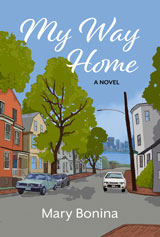 My Way Home a novel by Mary Bonina
My Way Home a novel by Mary Bonina
Červená Barva Press, 2025-
Mary Bonina is both poet and prose writer. My Way Home is her debut novel. She is the author of My Father's Eyes: A Memoir, and three published poetry collections: Living Proof, Clear Eye Tea, and Lunch in Chinatown. Her poem "Drift," won the UrbanArts "Boston Contemporary Authors" prize, and is engraved on a granite monolith, a permanent public art installation in the City. She has been honored as a fellow and awarded several residencies at the Virginia Center for the Creative Arts, including at the VCCA retreat in Auvillar, France. Her collaborative art experiments with composers, visual artists, and sculptors, have expanded poetry's vocabulary and reach. A longtime member of the Writers Room of Boston, where she served on the Board of Directors for more than a decade, Bonina is a graduate of the M.F.A. Program for Writers at Warren Wilson College.
"Mary Bonina's captivating debut deftly explores themes we all must wrestle with during our short stay on planet Earth. How do we live meaningful lives while harboring dark secrets and gaping loss? What do we settle for when we cannot get what we want? What does family really mean? Written with great wisdom and acuity, My Way Home is a beautiful novel, full of truths about the human condition, the ways we delight and disappoint one another, the ways we save each other with our generosity and love."
—Mary E. Mitchell, author of Starting Out Sideways and Love in Complete Sentences"—A cautionary story all too relevant to a time when a woman's right to control her body is somehow still—infuriatingly—unsettled."
—Gish Jen, author of Bad Bad Girl"My Way Home is an often unsettling, always engaging novel full of honesty, heart, and grace. It is both seductive and disturbing, and it will remind you of why you started reading stories in the first place—to be carried away to a more vivid and compelling world."
—John Dufresne, author of My Darling Boy"—A potent, provocative, and important novel."
—Anne Elezabeth Pluto, author of How Many Miles to Babylon?"—Bonina’s novel is a haunting look at first love, teen pregnancy and the dangerous secrets about to erupt in a family. Magnificent."
—Caroline Leavitt, New York Times bestselling author of Days of Wonder and Pictures of You"...My Way Home delves into a world of secrets, forgiveness, and 'a new idea of family.' Beautifully written...I loved it."
—Rosie Sultan, author of Helen Keller in Love and winner of the PEN Discovery AwardCover Artist: Teresa Lagrange
$19.95 | ISBN: 978-1-950063-91-8 | 302 Pages
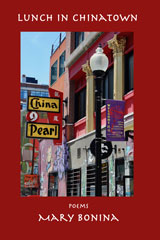 Lunch in Chinatown poems by Mary Bonina
Lunch in Chinatown poems by Mary Bonina
Červená Barva Press, 2024A fellow of the Virginia Center for the Creative Arts, Mary Bonina was finalist for the Goldfarb Fellowship and awarded several residencies, including one at the VCCA retreat, Moulin a Nef, in Auvillar, France. Previous publications include My Father's Eyes: A Memoir and two poetry collections—Living Proof and Clear Eye Tea, all from ČervenÁ Barva Press. Her poems and essays have appeared in The Lowell Review, Hanging Loose, Poets and Writers, Salamander, Mom Egg, Ovunque Siamo, Adelaide, and many other journals, and her work has been included in several anthologies, including Entering The Real World, VCCA Poets on Mt. San Angelo from Wavertree Press. Her completed novel, My Way Home, is on submission to publishers. Her poem "Drift" won Boston Contemporary Authors/Urban Arts prize and is carved in a granite monolith, a permanent public art installation in the City. Bonina has collaborated with composers of arts songs and new music, a sculptor, and her work has been translated into Japanese. She received a full fellowship from the Vermont Studio Center. A voiceover artist, she has recorded fiction, non-fiction, and poetry for blind readers. She offers classes, workshops, conference presentation, and individual coaching for writers. Bonina has been a long-time member of the Writers Room of Boston, where she served on the Board for more than a decade. She earned her M.F.A. in Fiction Writing from the Program for Writers at Warren Wilson College. She lives in Cambridge, Massachusetts. Her website is www.marybonina.com
Description:
New from Mary Bonina—and particularly timely—LUNCH IN CHINATOWN is a poetry collection inspired by the poet's work teaching the English language to immigrants from Haiti, China, Poland and other European countries, Central, Latin American, and African nations, and others. The poems highlight, as Patrick Sylvain, Professor of Global Studies, states in his introduction, "the universal nature of human connection, understanding, and a sense of shared humanity in the face of cultural and linguistic differences" Bonina sees her classes as offering survival skills, and compares her necessarily improvised lessons to the act of writing a poem, "that familiar process of one word, one thought, leading to another, often unanticipated one, recognizing endless possibilities, and finally settling on the right one in a moment of revelation."In this vivid, wonderfully empathetic book of poems, Lunch In Chinatown, Mary Bonina is an inquisitive seeker, not only set to teach English but also to learn about the lives of her immigrant students. There’s the student who worked with the very ill and the job did not allow wearing jewelry “without that ring on her finger/her hand felt too light, made her think/that she wasn’t in the world anymore,” another puzzled over the same abbreviation for Saint and Street, a young man recalled his young love in Port au Prince. In her masterful telling Bonina has given us glimpses of their worlds, both before and after the immigration. These poems celebrate the common human language, of disappointments and loss, aspirations and love, and also how poetry and the resolve of students and their teacher can make all the difference in the world.
—Pui Ying Wong, author of Fanling in OctoberIn Lunch in Chinatown "Mary Bonina's eloquent verses breathe life into the seemingly mundane, turning lunchtime into an exploration of the extraordinary moments hidden within our daily routines."
from the Introduction
Patrick Sylvain, P.H.D., M.F.A
Author, Unfinished Dreams/Rev San Bout (bilingual poetry)Cover photo: Abbi Sauro
$16.00 | ISBN: 978-1-950063-88-8 | 27 Pages
Author photo: Christopher Collyn
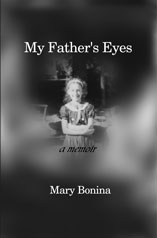 My Father's Eyes a memoir by Mary Bonina
My Father's Eyes a memoir by Mary Bonina
Červená Barva Press, 2013-
Mary Bonina has published two collections of poetry, Clear Eye Tea and Living Proof. She is also the author of Lunch in Chinatown, a chapbook of poems inspired by the experience of teaching the English language to recent immigrants in their work places. Her poetry and prose has been featured in Gulf Stream, Salamander, English Journal, Hanging Loose, and in many other journals and several anthologies, most recently in Entering the Real World: VCCA Poets on Mt. San Angelo, celebrating forty years of the Virginia Center for the Creative Arts. Commissioned by composer Paul Sayed, she wrote a suite of three poems, Grace in the Wind, and Sayed's composition for piano, cello, and soprano voice had its world premiere at the Longy School of Music of Bard College, Cambridge, Massachusetts in November of 2012. Bonina is a graduate of the M.F.A. Program for Writers at Warren Wilson College. In addition to being a Virginia Center for the Creative Arts Fellow since 2001 when she was named the finalist for the Goldfarb Fellowship in non-fiction, she is also a member of the Writers' Room of Boston, Inc. where she is working on a novel and a new collection of poetry. She lives in Cambridge, Massachusetts with her husband, poet Mark Pawlak and their son, Gianni Bonina-Pawlak.
ADVANCE PRAISE for MY FATHER’S EYES
"Not many pages into this gloriously moving book, a feeling begins to grow that it would have been a humbling yet exquisite experience to have sat and talked with Biagio John Bonina. What his daughter Mary Bonina has given us is a solid and lasting portrait of a man who was simple and complicated. (That is not a contradiction once you come to know him.)…America is a country of grand men and women who live on a modest scale, and no one fits that category more than he does. Once his eyes began to fail him, he lived even more for his family and its welfare and his efforts and work make him in my mind, the kind of real hero we fail to glorify anymore. So enter this book and come to know her father and his dedicated overwhelmingly loyal daughter, as well as a large stage of family members and friends who are unforgettable and insanely knowable and human."
-Edward P. Jones, author of The Known World"Mary Bonina casts her considerable spell with exquisite sentences and unerring evocative details. She is a writer of inordinate compassion, formidable intelligence, and unflinching honesty. My Father’s Eyes documents a family’s coming to grips with the legacy of blindness, a daughter’s unflagging allegiance to her father, and one man’s heroic determination to live a life of independence and quiet dignity despite obstacles that would crush the strongest of us. The book is an inspiration. When I finished reading it, I walked around for days seeing the world through its lens. Yes, it’s that good. It’s that important."
-John Dufresne, author of Requiem, Mass. and No Regrets, Coyote"Packard. Record player. Telephone party line. Fallout shelter. Holy Ghost. These and other blasts from the past make up the world of this beautiful, clear-eyed memoir that reads like a novel. It’s partly the story of a girl who loved words on her way to becoming a writer. Of all the words in her universe, the most important were eyes and seeing, for this was a girl growing up with a beloved father going blind. Becoming his guide and his eyes, she becomes herself. And what a character he is! We come to know him as if we’re all his children, one minute consumed with terror at the dangers he faces, and the next minute awed by his courage, and the next exasperated by his human flaws. And ultimately, we see and feel for ourselves what his daughter means when she says, "I know about love from being my father’s eyes."
-Ellen Cooney, author of A Private Hotel for Gentle Ladies
Reviews
Solstice Literary Magazine: http://solsticelitmag.org/mary-boninas-memoir-fathers-eyes/
$18.00 | ISBN: 978-0-9883713-8-5 | 290 Pages | In Stock
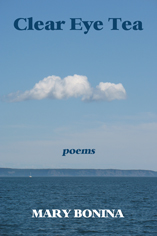 Clear Eye Tea by Mary Bonina
Clear Eye Tea by Mary Bonina
Červená Barva Press, 2010-
Mary Bonina has published poetry, memoir, and fiction in Salamander, Hanging Loose, Gulf Stream, many other journals, and in several anthologies, including Voices of the City from Rutgers University Center for Ethnicity, Culture, and Modern Experience. Winner of Boston Contemporary Authors, a public art project, her poem "Drift" was selected to be inscribed in a granite monolith now permanently installed outside a busy Boston subway station in Jamaica Plain. Bonina is a fellow of the Virginia Center for the Creative Arts and is a member serving on the Board of Directors of the Writers’ Room of Boston, Inc. She holds an M.F.A. from the Program for Writers at Warren Wilson College.
"Mary Bonina’s Clear Eye Tea celebrates the everyday events in our lives: a father returning from work; family members grown frail; a girl weeping on the train. And yet in her hands, the daily has a miraculous tinge. The sharp vision she was praised for as a child, when she was called "the one with good eyes" who could spot the "tiny spider floating/in the cup of wine" has developed into a kind of x-ray that illuminates the secrets, the motivations, the bare bones inside our common gestures. I closed this book with a feeling of more than happiness, something very close to joy, and I can think of no greater praise."
-John Skoyles, Poetry Editor, Ploughshares, author of The Situation"Here is poetry that does what the title of this book suggests: it gives us a careful steeping in the real, and shows us also how hard it is to stay in emotional touch with it. Here is childhood, for example, seen as if one has finally found a way to open a door on what it was really like. Here also is mortal dread and loss, each embraced without flinching, and here too is praise for gentleness and love, neither any less real than the suffering they are interwoven with. Here then is the "clear eye tea" of Mary Bonina’s poetry."
-Fred Marchant, Author of The Looking House"Mary Bonina’s poems, written with a strong, authentic voice and a compass-eyed gaze, balance between presence and absence: dirty plastic pretend ivory thing ("Shop of Small Pleasures"); You will hear, too, the dove/its awful sad cry, because/in the rainforest even the sadness/of a dove has more muscle. ("Sorcery"), and between whole and fractured lives: What on earth were they doing with the gun?/They were friends and it was an accident ("Shrine in Cambridge"). Line by line these poems breathe, and it is in this breath the reader’s imagination shares the gifts of revelation, reconciliation, and ultimately, grace."
-Dzvinia Orlowsky, author of Convertible Night/Flurry of Stones
November 8th, 2010: Interview with Mary Bonina by Lex Schroeder
October, 24, 2010: Review by Rene Schwiesow
$15.00 | ISBN: 978-0-9844732-9-8 | 69 Pages
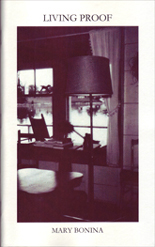 Living Proof by Mary Bonina
Living Proof by Mary Bonina
Červená Barva Press, 2007-
Review excerpt from: Prick of the spindle,
"Mary Bonina’s Living Proof is a hefty 45 pages and worth every drop of ink Červená Barva Press shelled out to bring it into the world. Each poem reads like a miniature story, stabbing at the heart of memory and nostalgia, capturing lifetimes in a single moment or turn of phrase..."
--Jen Garfield, editor
Prick of the SpindleTo read the whole review:
http://www.prickofthespindle.com/reviews/These are poems concerned with the primary relationships of our lives -- family, friends, lovers, nature -- and in them, there is always the larger world rattling around. This volume of narratives, lyrics, dialogues, and found poems demonstrates Bonina's accomplishment and range. Here is an assured voice imbued with musicality, surprising us in the simple way it offers up deeper meaning, often using imagery drawn from the everyday.
"...the voice of these poems knows death, luck, the mall, the hard edges of place, New England places, the violence of the world. It runs very concretely and in many poems, past what its bearer sees as if standing still in deep attention. It is written so that "he who runs may read" but turns entirely inside out the terms and assumptions of that old insult. What a place this human world would be if we all ran at Mary Bonina's speed, what Flannery O'Connor once called the terrible speed of mercy."
$7.00 | 46 Pages | No longer available
--Mary Baine Campbell
author of TROUBLE (poems), Carnegie Mellon U Press and The World, The Flesh, and Angels (poems), Beacon Press
Erika Burkart
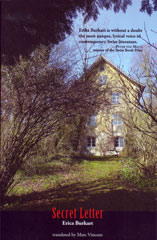 Secret Letter by Erika Burkart, translated by Marc Vincenz
Secret Letter by Erika Burkart, translated by Marc Vincenz
Červená Barva Press, 2016-
Swiss poet Erika Burkart (1922-2010) has been compared to the likes of Ingeborg Bachmann, Friedericke Mayröcker, and Rainer Maria Rilke. During the latter half of her lifetime, the Swiss literary establishment perceived her not only as the grande dame of German- Swiss poetry, but also as an elusive, metaphysical, at times eccentric enigma of contemporary German-language literature. Born in Aarau, Switzerland, Burkart published over 24 collections of poetry and nine prose works, writing for the most part in the house of her childhood (the former summer house of the Prince-Abbot of Muri), Haus Kapf in Althäusern, Aargau, which was run as a tavern by Erika's parents.
Burkart received numerous literary prizes during her lifetime, including the Johann-Peter-Hebel-Preis (1978), the Wolfgang-Amadeus-Mozart- Preis (1990), the Joseph-Breitbach-Preis (2002), and the Gottfried-Keller-Preis (1992). To date, she is the only woman ever to have been awarded Switzerland's highest literary prize, the Grosser Schiller-Preis (2005).
Born in Hong Kong, Marc Vincenz is the author of nine collections of original poetry; his latest are This Wasted Land, and Its Chymical Illuminations (Lavender Ink, 2015), Becoming the Sound of Bees (Ampersand Books, 2015) and Sibylline, a book-length poem (Ampersand Books, 2016). The Washington Independent Review of Books recently called Vincenz "[a] peripatetic linguist... [he] prospers through travel like a psychoactive medicine man. Each poem is an open environment where anything can happen-a ceremony of advanced thinking-where a pilgrim of great altitudes accepts life's vagaries." Vincenz is also the translator of many German-language poets, including the Herman Hesse Prize winner, Klaus Merz, Werner Lutz, Erika Burkart, Alexander Xaver Gwerder, Robert Walser and Jürg Amman, and has published ten collections of translations-the latest is A Late Recognition of the Signs by Erika Burkart. His translation of Klaus Merz's collection Unexpected Development, was a finalist for the 2015 Cliff Becker Book Translation Prize and will be published by White Pine Press in 2018. He has received several grants from the Swiss Arts Council and a fellowship from the Literarisches Colloquium Berlin. His own work has been translated into German, Russian, Romanian, French, Icelandic and Chinese; Bucharest's Tractus Arte Press released a Romanian translation of his collection The Propaganda Factory, at the 2015 Bucharest Book Fair. He is International Editor of Plume, Executive Editor of MadHat Press, and Plume Editions, Co-Editor of Fulcrum, and lives and writes in Western Massachusetts. Recent and forthcoming publications include The Nation, Ploughshares, Guernica, Washington Square Review, The Common and World Literature Today.
"Erika Burkart often evokes darkness, all the while "recu[ing] / fragments of images / from the dark chambers"-and these bits and pieces of the world, which she gathers with such care, gleam with a lasting, even healing light in her work. A precise and loving observer of nature, this major Swiss poet is especially sensitive to the question of how perceptions can be written down to "find [her]self / [...]-a language / no one knows anymore." For her, words raise no insurmountable barriers between the self and outside reality, but rather encourage her, as it were, to examine how one might more fully live."
"With Secret Letter, Marc Vincenz has gracefully and accurately rendered one of the last and most important books written by this philosophically minded poet. Hats off to him, for these full-fledged English poems express all the discreet music, subtle emotions, and thought-provoking qualities of the originals."
-John Taylor, poet, translator of Philippe Jaccottet, Jacques Dupin, and Jose-Flore Tappy"Secret Letter by Erika Burkart offers lyrics so pristine and resonant in English that it's hard to fathom that these are translations. Marc Vincenz has done a great service for English-speaking, opening our shutters, our vistas onto the light- rich work of this amazing poet. Each poem mirrors creation and the birth of poetical language, without affectation or even extra syllables. The ensemble remins us of why we turned to poetry in the first place, for its spare, lyrical power, its shock of beauty, emotion, and insight."
-Marilyn Kallet, poet, translator of Paul Eluard, Benjamin Peret, and Chantal Bizzini"Burkart's poems leave behind much more than a fleeting trace in the snow. Her delicate poetic footsteps have long since inscribed themselves in the memory of nature and her readers."
-Deutschlandfunk"Erika Burkart possessed something like a second sight. She saw people, nature, the world, with both an inner and outer vision."
$15.00 | ISBN: 978-0-9966894-3-4 | 83 Pages | In Stock
-Bieler Tagblatt
Alan Britt
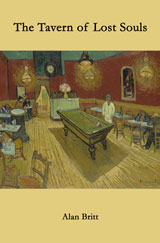 The Tavern of Lost Souls by Alan Britt
The Tavern of Lost Souls by Alan Britt
Červená Barva Press, 2023-
I grew up in southeastern Florida where hot summer days sizzled and summer nights’ humid lips of jasmine pressed against my frosted bedroom jalousies. An aspiring athlete, I wanted to play for the Milwaukee Braves-I thought Hank Aaron was poetry in motion. Well, songwriter for a garage band, later I found myself a college sophomore writing poetry and a founding member of a group of poets and artists known as the Immanentists. Though somewhat eclectic, we were a blend of European Surrealism with a Native American sensibility who believed that through language and paint we could attain spiritual fusion with the natural world. After reading The Immanentist Anthology, the great French poet, Yves Bonnefoy, said that Immanentism was the most exciting poetry he had seen from the US in decades. What a thrill! I remained in contact with Yves until his death in 2016. Eventually, I drove a yellow Ryder truck from West Palm Beach to Baltimore to attend the graduate Writing Seminars at Johns Hopkins University where I made a beeline to the National Gallery in DC to marvel at the wondrous creations by Rembrandt, Vermeer, Monet, Manet, and Odilon Redon. Baltimore became my heaven with snow. Inspired by Andrew Marvell, William Blake, Walt Whitman, Federico García Lorca, Gabriela Mistral, Pablo Neruda, Eunice Odio, Sandor Kanyadi, Kristina Ehin, plus hundreds of others, I now write poems about anything and everything. Along the way I've learned that to write poetry is to love, and to love is to write poetry.
-Alan BrittAlan has published 25 books of poetry.
"When thunder becomes symbolic again, / then and only then we'll discover / the true nature of existence." Not true. We know it right here in this book-this prism-this kaleidoscope of the soul bursting with imagination. And the poet's everyday world is never lost, even while tethered to high-flying multi-imaged phrases and clauses. Alan Britt's literary personality is here, precise in every note. The poetic will of each line, urgency and flair, teaches us the game.
-Grace Cavalieri, Producer/Host of Public Radio's "The Poet and the Poem from the Library of Congress" and Maryland Poet LaureateIn The Tavern of Lost Souls, each poem rises through the reader like wine, filling the mind with the intoxication of life viewed from this unique and humanitarian perspective. Alan Britt combines elements of sensuality and subtle humor with a depth of feeling "thick with the aroma of fresh imagination." About Baudelaire he writes, "Sifting his way through human frailty, / paying attention to things lesser poets buried / beneath the borrowed sentiments of their age . . ./" These words could apply to his own work as well, as reality and fantasy walk through these pages together, creating an addictive book one finds difficult to put down.
$18.95 | ISBN: 978-1-950063-26-0 | 83 Pages
-Patty Dickson Pieczka, Author of the novel Finding the Raven and winner of the 2012 Library of Poetry Book Award from The Bitter Oleander Press for Painting the Egret's Echo
Martin Burke
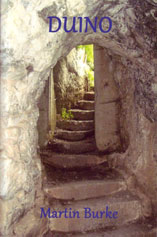 Duino by Martin Burke
Duino by Martin Burke
Červená Barva Press, 2016-
Poet and Playwright Martin Burke is from Ireland but has lived for many years in Flanders (the northern Flemish speaking part of Belgium) a region with which he strongly identifies. More akin to the broad European visionary tradition than to any form of social realism, his work is noted for his insight and lyricism, qualities which are to the forefront in this version of the famous work by Rilke. He is currently working on a book-length poem The April Calends.
1
Who from the angels will hear me?
$7.00 | ISBN: 978-0-9966894-9-6 | 22 Pages | In Stock
Into what existence may I vanish?
Why is it that, though it can, beauty does not destroy us?
Why does terror spring from every angel's mouth in joy?
Yet this is the world's landscape where, somehow, we endure
And the lovers, who annihilate annihilations
Lock time like a prisoner in their arms but their hearts are birds in air
Spring and its stars require us and the mission of music also
As we require mirrors to hold our expectations
As sinful and profane are our chosen companions
Where Antaeus is livid in air but renewed on the ground (oh let there be praise for such falling for this is no elegy)
As lovers are (oh pleasurable earth that such joy be yours!)
Sap to earth-mould that love rise again in any space, region or occasion through which its arrow passes
To focus on the unseen voice prompting a saints' ecstasy
Listening only to the secretive breath of the world
Speaking histories and chronicles-but what will they tell of you?
Let them tell that you were enraptured and quivered
In the arrows flight within you.
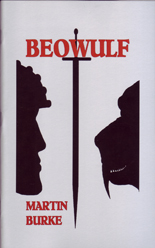 Beowulf by Martin Burke
Beowulf by Martin Burke
Červená Barva Press, 2009-
"Burke is the eloquent essayist of the sublime"
Projected Letters"His style is far ahead in terms of imaginative inventiveness
This is startling, original work"
Kiosque Review
Beowulf
TO BEGIN with the hero is inaccurate
Begin with his opposite
The one he must meet
The one he will forever be named byBegin with time ripening to a specific purpose
With events entering history at a critical moment
Begin with GrendelGrendel: beast/man/beast
Grendel: purpose-driven like no other
Grendel: a law unto himselfThis is the one who names the hero for all time
The one doomed from the beginning
And yet this is not a minor roleO no
Not Grendel
Not the man-beast as he broods in his lair
Not as he plots the destruction he will bring
Not as he delights in the prospectAnd he will bring destruction
O yes
Destruction and wanton despair
To those who cannot fight himMartin Burke was born in Ireland but lives now in Brugge, Belgium
$7.00 | 52 Pages | In Stock
Philip E. Burnham, Jr.
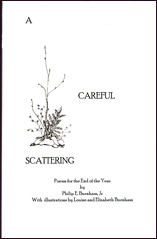 A Careful Scattering by Philip E. Burnham, Jr.
A Careful Scattering by Philip E. Burnham, Jr.
With illustrations by Louise and Elizabeth Burnham
Červená Barva Press, 2007-
Each year, for the forty-two Christmases of our married life, my wife, Louise Hassel Burnham, illustrated the poems I wrote to celebrate the festival season of the years’ ending and beginning, the Solstice, Christmas, and New Year. Her illustrations were in a variety of media: line drawings, block prints (both wood and vegetable), collage and paint. Many of the drawings represent views of our house in Newton, Massachusetts, including such details as the front door, a mirror in the hall, the fireplace. Others include the names and places of family and friends woven into trees. Louise’s final card, from 2001, is a gathering up of many earlier cards. While the original intent of these cards was to celebrate a single year, together they sum up our lives over four decades. We discussed their publication before her death, and it was she who chose the title, "A Careful Scattering." In their publication I want to remember our partnership, and to dedicate this book to her memory with love.
$16.95 | ISBN 978-1-4357-0003-1 | 98 Pages | In Stock: 30
Olivia Bush
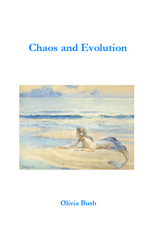 Chaos and Evolution by Olivia Bush
Chaos and Evolution by Olivia Bush
Červená Barva Press, 2015-
Olivia Bush is currently a junior at Simmons College, an all-women's college in Boston, Massachusetts, and is studying English and Communications. After she graduates, she aspires to become an editor. Born and raised in Central New Jersey, many of her poems are inspired by its scenery from the factories on the Turnpike facing the city skyline, to the picturesque shore. She is a poetry buff, who enjoys reading and draws inspiration from works from a variety of eras. Besides writing, she is an immature distance runner, and currently works as the director of a mentoring program for ninth and tenth graders. Despite the usually dark undertones present throughout most of her works, she enjoys a good comedy, and one of her long-term dreams is to write for a cartoon.
The Pin
Your peculiarity stuck me like a pin,
As I am a peculiar soul;
It met my delicate skin, drawing blood,
Which dripped to the floorIt was surprising: just a pin
drew such abundant blood;
but the bleeding roused my fancy,
as it poured from veins to the airWhen it collected in a puddle, stained the rug;
$7.00 | 18 Pages | In Stock
I knew I had to do something
To stop the bleeding-
I eventually learned bandages only go so far
Home | Červená Barva Press Books | Poetry Chapbooks | Poetry Books | Anthologies | Fiction | Flash Fiction | Literary Journals | Non-fiction | Plays | Memoirs | Used Books | Audio CD's
